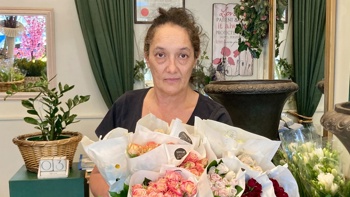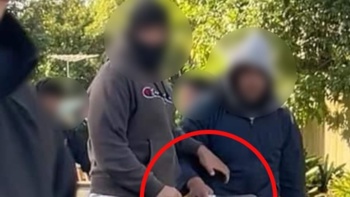Bronwyn Jenkins is standing in the middle of a paddock screaming.
She’s just been told her 24-year-old son, James Jenkins, is missing in the Waitematā Harbour and presumably dead.
“It’s every mother’s worst, worst nightmare. I just remember standing in the paddock screaming,” Bronwyn told the Herald.
Desperate for information, she dialed 111 from the paddock on her Clevedon property hoping they could tell her what happened.
James was leaving a bar at the Auckland Viaduct in the early hours of October 7, 2019 when Joniero Irving saw him and began acting aggressively.
James ran away and dived into the harbour to escape Irving. From land, Irving, who was accompanied by a friend, stalked James. CCTV footage showed him at times hiding behind various objects as he watched him in the water.
According to court documents, witnesses overhead Irving making threats including “I want to f***ing kill you”.
“James, his biggest fear was drowning,” Bronwyn said.
“So, for him not to come out of that water, he was afraid.”
James Jenkins, who died after jumping into the water at Auckland's waterfront while fleeing someone trying to rob him of his jewellery.
James swam to a ferry and climbed on board. Irving approached the ferry and tried to board it, but was stopped by a ferry employee. Irving made threats and demands to James, wanting him to hand over the two gold Sovereign coin rings he was wearing.
James handed over the rings and tried to escape to the pier, but Irving blocked him. James jumped back into the water and eventually drowned.
It took police two years to lay charges against Irving, and the case was heard in the High Court at Auckland in February this year. Bronwyn said the delay was “re-traumatising” and the eventual manslaughter sentence handed to Irving – four years and eight months after his death – was “not good enough”.
Irving has disputed some of the elements in the case against him and appealed the sentence, with the outcome still pending.
Wait times for criminal trials at the High Court at Auckland have increased since 2017, although this partially due to the impact of Covid-19 lockdowns.
In 2017, the median wait time for a case was 336 days. This grew to 526 days in 2022.
‘Multiple layers of trauma’
Victim advocate Ruth Money said the delays caused “multiple layers of trauma”.
“Literally for every whānau and friends ... they all say that your life goes on hold because you’re barely surviving to get to what they call the ‘justice day’.
“Everyone’s expectation of what justice looks like is different, but essentially, every day is hard. Some of them struggle to get out of bed.”
Bronwyn says more needs to be done to address the backlog so families of victims do not need to wait as long as hers did for justice – and for penalties for such crimes to be harsher.
“I couldn’t brush my teeth; I would vomit daily. I feel like we’ve been living a sentence, [and] we didn’t commit a crime. We’re living a life sentence until we take our last breath.
“I was relieved that there was a conviction, but a four-year, eight-month sentence … that’s all my son’s life was worth. The justice system isn’t working anymore.”
A Courts of New Zealand spokesperson said there had been an increase in lengthy High Court criminal and civil cases, including a significant jump in homicide cases.
Other drivers behind wait times at the High Court at Auckland included adjournments and the “significant impact” of Covid-19 restrictions which were longer and more frequent in Auckland than other parts of the country.
The High Court has jurisdiction for the most serious criminal offending, and counsel for the Crown and defence generally required at least 12 months to adequately prepare their case, the spokesperson said.
“While the High Court conducted as much business as it could, longer trials with multiple defendants and long civil hearings were particularly impacted by Covid-19, which flowed through to the increased time to hearing for criminal trials.
“As at May 31, 2023, the first available date for criminal trials in Auckland has returned to pre-Covid levels. This is approximately 13-14 months.”
Bronwyn also wanted to know why the other person who was with Irving had not been charged. Auckland City CIB Detective Inspector Scott Beard said a second person was identified as being present during the incident but there was insufficient evidence to file charges.
The police investigation into James’ death – which was complex and challenging – was now complete.
“Police working on the case spent a number of months obtaining legal opinions on the matter to ensure a comprehensive investigation was completed, and this did take some time, which did include the Covid period.
“We will continue to engage with the victim’s family, with a meeting planned in the near future.”
‘The worst thing you could ever have to do’
The loss of James is just as painful today for Bronwyn as it was that day in 2019 when she stood in the paddock screaming. She described those harrowing intervening years as unimaginable for most parents.
She cannot sleep without medication; her mental health has declined significantly, and she still struggles to visit her son’s grave.
Irving has not returned the two Sovereign rings he took from James or revealed what he did with them. Bronwyn is desperate for to get them back so she can give them to her daughters.
“Somebody knows where they are. Somebody knows what he did with them.”
James loved his jewellery, his dogs, tattoos and motorbikes – but more than that, he loved his family, including his sisters, who were only 9 and 12 when he died.
“There’s no words to describe what it’s been like for the girls and I over the past four years.”
James’ body was found a week after he went missing. As the search continued, Bronwyn’s 12-year-old daughter asked if there was any chance her brother might be found alive.
“She was sitting on my knee facing me and I had to tell her no. No.
“It was really difficult when we couldn’t find his body.”
Bronwyn Jenkins' son James died after jumping into the water at Auckland's waterfront while fleeing someone trying to rob him of his jewellery. Photo / Jason Oxenham
At the funeral home, James’ body was covered with a sheet, with only his arm visible.
“I really couldn’t hug him or say goodbye properly. [I will] never forget the smell in the room, which I was warned about. I was advised not to remove the sheet.”
James lived his life to the fullest. Despite suffering a severe head injury as a child that impacted him as an adult, he loved skateboarding, snowboarding and ice hockey.
“He was just always smiling, [he could] make friends with anybody … [he was] never, ever violent.”
Soon after James died, New Zealand went into the Covid-19 lockdown period.
“I was actually pleased that we went into lockdown because I wanted the whole world to stop. And it did. I was like, “Oh, thank you, James’.”
She coped through the Covid period by “going bush” with her dogs.
“I walked for miles. Apparently, that’s one of the best things to do, is to be in nature and keep moving.”
Bronwyn Jenkins shows the tattoo she got to memorialise her son James Jenkins, who died after jumping into the water at Auckland's waterfront. Photo / Jason Oxenham
Today, Bronwyn does her best to live a simple life. She’s started a pottery studio, attracted to the therapeutic nature of molding clay into new forms.
Outside her Clevedon home, one of James’ beloved staffy dogs runs around, grunting for pats. Inside, her walls feature myriad photos of her boy.
She pulls out album after album of photos of her son with his friends, on holiday in Indonesia and with his family.
Around her neck is a bright gold chain with a Sovereign coin pendant.
“James always had this on, but he didn’t that night because he had given the chain to his dad, so I did manage to get this back.”
The anniversary of James’ death is approaching, and so is his birthday and then Christmas.
“Around this time is horrendous. You don’t really want to celebrate anymore.”
Bronwyn had James when she was 20. The pair travelled a lot together, with a young James even telling his mum he wanted to marry her because there would be no other woman he would love more.
“James and I had a special bond. He was six months old on my 21st …
“To bury your child, I think any parent would agree, is the worst thing you could ever have to do.”
Julia Gabel is an Auckland-based journalist who joined the Herald in 2020.
Take your Radio, Podcasts and Music with you

/cloudfront-ap-southeast-2.images.arcpublishing.com/nzme/BK2DFIENZJDJ5LPFUFONIL2EZ4.JPG)
/cloudfront-ap-southeast-2.images.arcpublishing.com/nzme/IRJHBSF6OJG6PPWANLUBUPU4VA.JPG)
/cloudfront-ap-southeast-2.images.arcpublishing.com/nzme/KBUDXYPVFVE6XJPV2AWUEFOCMM.JPG)








